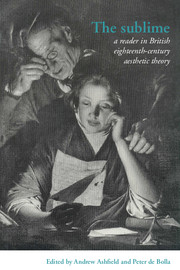Book contents
- Frontmatter
- Contents
- List of Abbreviations
- Introduction
- Part I The Longinian tradition
- 1 Dionysius Longinus on the sublime (1743)
- 2 Remarks on a book entitled, Prince Arthur (1696)
- 3 The advancement and reformation of modern poetry (1701)
- 4 The grounds of criticism in poetry (1704)
- 5 Essays upon several subjects (1716)
- 6 A miscellany of ingenious thoughts (1721)
- 7 An essay on the theory of painting (1725)
- 8 Reflections on the nature and property of languages (London 1731)
- 9 The works (1735)
- 10 Lectures on poetry (1742)
- Part II Rhapsody to rhetoric
- Part III Irish Perspectives
- Part IV The Aberdonian Enlightenment
- Part V Edinburgh and Glasgow
- Part VI From the Picturesque to the Political
- Sources and further reading
1 - Dionysius Longinus on the sublime (1743)
Published online by Cambridge University Press: 05 June 2012
- Frontmatter
- Contents
- List of Abbreviations
- Introduction
- Part I The Longinian tradition
- 1 Dionysius Longinus on the sublime (1743)
- 2 Remarks on a book entitled, Prince Arthur (1696)
- 3 The advancement and reformation of modern poetry (1701)
- 4 The grounds of criticism in poetry (1704)
- 5 Essays upon several subjects (1716)
- 6 A miscellany of ingenious thoughts (1721)
- 7 An essay on the theory of painting (1725)
- 8 Reflections on the nature and property of languages (London 1731)
- 9 The works (1735)
- 10 Lectures on poetry (1742)
- Part II Rhapsody to rhetoric
- Part III Irish Perspectives
- Part IV The Aberdonian Enlightenment
- Part V Edinburgh and Glasgow
- Part VI From the Picturesque to the Political
- Sources and further reading
Summary
Section I
…But I request you, my dear friend, to give me your opinion on whatever I advance, with that exactness which is due to truth, and that sincerity, which is natural to yourself. For well did the sage answer the question, in what do we most resemble the gods? when he replied, in doing good and speaking truth. But since I write, my dear friend, to you, who are versed in every branch of polite learning, there will be little occasion to use many previous words in proving, that the sublime is a certain eminence or perfection of language, and that the greatest writers, both in verse and prose, have by this alone obtained the prize of glory, and rilled all time with their renown. For the sublime not only persuades, but even throws an audience into transport. The marvellous always works with more surprising force, than that which barely persuades or delights. In most cases, it is wholly in our own power, either to resist or yield to persuasion. But the sublime, endued with strength irresistible, strikes home, and triumphs over every hearer. Dexterity of invention, and good order and economy in composition, are not to be discerned from one or two passages, nor scarcely sometimes from the whole texture of a discourse; but the sublime, when seasonably addressed, with the rapid force of lightning has borne down all before it, and shown at one stroke the compacted might of genius.…
- Type
- Chapter
- Information
- The SublimeA Reader in British Eighteenth-Century Aesthetic Theory, pp. 22 - 29Publisher: Cambridge University PressPrint publication year: 1996

